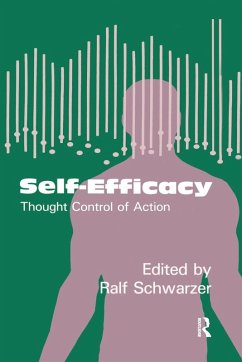Self-Efficacy
Thought Control Of Action
Herausgegeben:Schwarzer, Ralf
Self-Efficacy
Thought Control Of Action
Herausgegeben:Schwarzer, Ralf
- Broschiertes Buch
- Merkliste
- Auf die Merkliste
- Bewerten Bewerten
- Teilen
- Produkt teilen
- Produkterinnerung
- Produkterinnerung
The goal of this book is to illustrate the change in emphasis during the 1980s from one dominated by a behaviouristic perspective to one much more congnitive in its emphasis. It is aimed at research psychologists and graduate-level psychology students.
Andere Kunden interessierten sich auch für
![Child-Centred Music Therapy Child-Centred Music Therapy]() Viggo KrügerChild-Centred Music Therapy38,99 €
Viggo KrügerChild-Centred Music Therapy38,99 €![Personality and Disease Personality and Disease]() Personality and Disease41,99 €
Personality and Disease41,99 €![Happiness and Self-efficacy Happiness and Self-efficacy]() Najaf TahmasbipourHappiness and Self-efficacy24,99 €
Najaf TahmasbipourHappiness and Self-efficacy24,99 €![Supervisory coaching and self efficacy on work engagement Supervisory coaching and self efficacy on work engagement]() Georgina TakyiSupervisory coaching and self efficacy on work engagement24,99 €
Georgina TakyiSupervisory coaching and self efficacy on work engagement24,99 €![Handbook of Terror Management Theory Handbook of Terror Management Theory]() Handbook of Terror Management Theory102,99 €
Handbook of Terror Management Theory102,99 €![The efficacy of training life skills on mental health and self esteem The efficacy of training life skills on mental health and self esteem]() Mohamad KhaledianThe efficacy of training life skills on mental health and self esteem27,99 €
Mohamad KhaledianThe efficacy of training life skills on mental health and self esteem27,99 €![The Practices and Problems of Employees Appraisal Systems The Practices and Problems of Employees Appraisal Systems]() Liranso G. SelamuThe Practices and Problems of Employees Appraisal Systems33,99 €
Liranso G. SelamuThe Practices and Problems of Employees Appraisal Systems33,99 €-
-
-
The goal of this book is to illustrate the change in emphasis during the 1980s from one dominated by a behaviouristic perspective to one much more congnitive in its emphasis. It is aimed at research psychologists and graduate-level psychology students.
Produktdetails
- Produktdetails
- Verlag: Taylor & Francis
- Seitenzahl: 426
- Erscheinungstermin: 17. Dezember 2015
- Englisch
- Abmessung: 229mm x 152mm x 23mm
- Gewicht: 613g
- ISBN-13: 9781138996021
- ISBN-10: 1138996025
- Artikelnr.: 44395279
- Herstellerkennzeichnung
- Libri GmbH
- Europaallee 1
- 36244 Bad Hersfeld
- gpsr@libri.de
- Verlag: Taylor & Francis
- Seitenzahl: 426
- Erscheinungstermin: 17. Dezember 2015
- Englisch
- Abmessung: 229mm x 152mm x 23mm
- Gewicht: 613g
- ISBN-13: 9781138996021
- ISBN-10: 1138996025
- Artikelnr.: 44395279
- Herstellerkennzeichnung
- Libri GmbH
- Europaallee 1
- 36244 Bad Hersfeld
- gpsr@libri.de
Ralf Schwarzer
I: Self-Efficacy and Human Functioning; Exercise of Personal Agency Through the Self-Efficacy Mechanism; Two Dimensions of Perceived Self-Efficacy: Cognitive Control and Behavioral Coping Ability; Expectancies as Mediators Between Recipient Characteristics and Social Support Intentions; II: Self-Efficacy and Human Development; Perceived Control: Motivation, Coping, and Development; Adults' Expectancies About Development and its Controllability: Enhancing Self-Efficacy by Social Comparison; Personal Control Over Development: Some Developmental Implications of Self-Efficacy; III: Self-Efficacy, Stress, and Emotion; Perceived Self-Efficacy and Phobic Disability; Self-Efficacy and Depression; Self-Efficacy as a Resource Factor in Stress Appraisal Processes; IV: Self-Efficacy and Health Behaviors; Self-Efficacy in the Adoption and Maintenance of Health Behaviors: Theoretical Approaches and a New Model; Self-Efficacy and Attribution Theory in Health Education; The Influence of Expectancies and Problem-Solving Strategies on Smoking Intentions; V: Self-Efficacy, Physical Symptoms, and Rehabilitation of Chronic Disease; Role of Physical Self-Efficacy in Recovery from Heart Attack; Perceived Self-Efficacy in Self-Management of Chronic Disease; Self-Efficacy Expectancies in Chronic Obstructive Pulmonary Disease Rehabilitation; Self-Efficacy Mechanism in Psychobiologic Functioning
I: Self-Efficacy and Human Functioning; Exercise of Personal Agency Through the Self-Efficacy Mechanism; Two Dimensions of Perceived Self-Efficacy: Cognitive Control and Behavioral Coping Ability; Expectancies as Mediators Between Recipient Characteristics and Social Support Intentions; II: Self-Efficacy and Human Development; Perceived Control: Motivation, Coping, and Development; Adults' Expectancies About Development and its Controllability: Enhancing Self-Efficacy by Social Comparison; Personal Control Over Development: Some Developmental Implications of Self-Efficacy; III: Self-Efficacy, Stress, and Emotion; Perceived Self-Efficacy and Phobic Disability; Self-Efficacy and Depression; Self-Efficacy as a Resource Factor in Stress Appraisal Processes; IV: Self-Efficacy and Health Behaviors; Self-Efficacy in the Adoption and Maintenance of Health Behaviors: Theoretical Approaches and a New Model; Self-Efficacy and Attribution Theory in Health Education; The Influence of Expectancies and Problem-Solving Strategies on Smoking Intentions; V: Self-Efficacy, Physical Symptoms, and Rehabilitation of Chronic Disease; Role of Physical Self-Efficacy in Recovery from Heart Attack; Perceived Self-Efficacy in Self-Management of Chronic Disease; Self-Efficacy Expectancies in Chronic Obstructive Pulmonary Disease Rehabilitation; Self-Efficacy Mechanism in Psychobiologic Functioning









